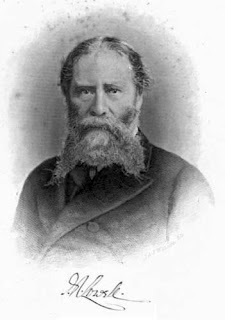What follows is a short clip from James Russell Lowell's 90-line poem written in 1844.
It's fresh on my mind because it was cited in a New American article about Obamacare and I've been looking for poems to highlight in April.
It is, after all, National Poetry Month.
Once to every man and nation comes the moment to decide,
In the strife of Truth with Falsehood, for the good or evil side;
Some great cause, God's new Messiah, offering each the bloom or blight,
Parts the goats upon the left hand, and the sheep upon the right,
And the choice goes by forever 'twixt that darkness and that light.
Hast thou chosen, O my people, on whose party thou shalt stand,
Ere the Doom from its worn sandals shakes the dust against our land?
Though the cause of Evil prosper, yet 'tis Truth alone is strong,
And, albeit she wander outcast now, I see around her throng
Troops of beautiful, tall angels, to enshield her from all wrong.
Backward look across the ages and the beacon-moments see,
That, like peaks of some sunk continent, jut through Oblivion's sea;
Not an ear in court or market for the low, foreboding cry
Of those Crises, God's stern winnowers, from whose feet earth's chaff must fly;
Never shows the choice momentous till the judgment hath passed by.
Careless seems the great Avenger; history's pages but record
One death-grapple in the darkness 'twixt old systems and the Word;
Truth forever on the scaffold, Wrong forever on the throne,—
Yet that scaffold sways the future, and, behind the dim unknown,
Standeth God within the shadow, keeping watch above his own.
I took the time to read up on Lowell and the crisis he was referencing ~ most likely the Mexican War coupled with the increasing tension over the expansion of slavery.
Here's a short description of this famous American poet.
Lowell's reputation at the time of his death in 1891 was a superstition. His fame as a man of letters was international, but he was not in any respect a popular writer. Except for a few school-room pieces like "The Vision of Sir Launfal," Lowell's poetry was considered too difficult by most readers.Dont let that stop you from delving deeper into his works because
No one as richly versatile and influential as Lowell will forever remain unattractive or unrewarding to scholars.
Consider using poetry as a sounding board for the next few weeks.
Sherry at Semicolon has made it easy to play along.
The rest of The Present Crisis follows this entry.

No comments:
Post a Comment